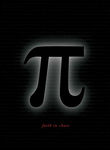
My fiancé is a conspiracy theorist. While I laugh appreciatively and smile with a “you’re crazy” look on my face when she goes off on the occasional rant, there is a part of me that really gets going on the things she suggests. I don’t let that part of myself have center stage that often, but it’s always interesting when I do. The central idea that it believes in is that there is a hidden side to everything. For every idea that presents one face to the world, it has twenty other faces that it hides. It is also this part that likes the idea of numerology; the idea that everything can be broken down to numbers and the combinations thereof.
∏ (heretofore referred to as Pi for ease of typing) brought that part out like no movie I have ever seen. When it was over, my mind was simply buzzing with possibilities and eventualities. Pi didn’t just have a great numbers game in it, though. It also presented some pretty wild ideas, and did things with character and story that many higher budget movies can’t pull off.
Pi’s central character is Max Cohen, a mathematical genius doing research on ∏ and its relation to complex systems, namely the stock market. Also, Max has a mountain of mental problems. When he was a kid, he stared too long at the sun, and he consequently gets very intense headaches from time to time. He’s paranoid, anti-social, unfriendly, and emotionally unstable. One day, when his personal supercomputer named Euclid spits out a couple of stock picks, it immediately crashes afterwards, but not before printing out a seemingly random array of 216 digits. Frustrated and saddened, Max throws the printout away.
Max is approached by a pushy Jewish numerologist who is looking for some mathematical significance in the Torah, or the Old Testament. He and his colleagues are convinced the Torah is some sort of mathematical code sent to them directly from God, and they want to understand its mysteries. They think the 216-digit number that Euclid printed out is the key to the entire thing. Also confronting Max is an equally pushy financial executive who wants to have Max’s findings on the stock market. After bribing him with a military-grade processor for his computer, he tells them of the 216-digit number. They irresponsibly apply it, though, and in the process bring about the country’s worst financial crisis in history. Sound familiar?
This movie presents the idea of the interconnectedness of everything, and that was really what made me appreciate it as much as I did. Another central idea of Pi was that some ideas are just too big for us, and that genius and madness look very similar to each other. Max is wrestling with ideas that have a huge impact on our world, and they drive him crazy. As the film progresses, he psychoses increase and increase, and he starts seeing some pretty disturbing stuff. You as the viewer are not even sure what’s real and what’s not. Director Darren Aronofsky takes a very personal and claustrophobic approach to the film, using close-ups and a rig where the camera is attached to the person its filming to keep the viewer in very close contact with the main character. You can’t really get away.
What Pi has to say about the nature of genius and the advancement of ideas is startling and harrowing. Can we as humans only get to a certain point, and then God drives the people who exceed it insane? Or is God the one who presents the advancing ideas in the first place, always trying to push humans in a certain direction, taking into account our free will? Max believes at one point that God has “chosen” him. That could very well be legitimate, but it sounds a lot like a crazy person talking. So is it divine appointment, or serious psychosis? Or is it both? Did Max get chosen by God, and that made him crazy?
This is a lot of meat for a 90 minute film, and a lot of other movies can’t cram nearly as much in. Pi is not the flashiest picture, and has a pretty small budget. The black and white filming on high-contrast reversal film brings a lot of dirt and grime to the experience, accentuating the feeling of alienation and psychosis, bring us into Max’s world a little. It’s a little distracting, but it successfully brings on a feeling. Unlike Aronofsky’s second film, Requiem For a Dream, I would potentially watch this again. Don’t get me wrong; I’m very glad I saw Requiem. The experience was just too traumatic. Pi, however, is a fascinating film, and even manages to bring out the conspiracy theorist in me. My fiancé would be proud.
Iconic Lines:
“Assumption: patterns are everywhere in nature. Evidence: the cycling of disease epidemics; the wax and wane of caribou populations; sun spot cycles; the rise and fall of the Nile.”
“If you want to find the number 216 in the world, you’ll be able to find it everywhere. 216 footsteps from a near street corner to your front door. 216 seconds you spend riding on an elevator. When your mind becomes obsessed with anything, you will filter everything else out to find that thing everywhere.”
“There will be no order; only chaos."
22 Rating: 13
Particle Man